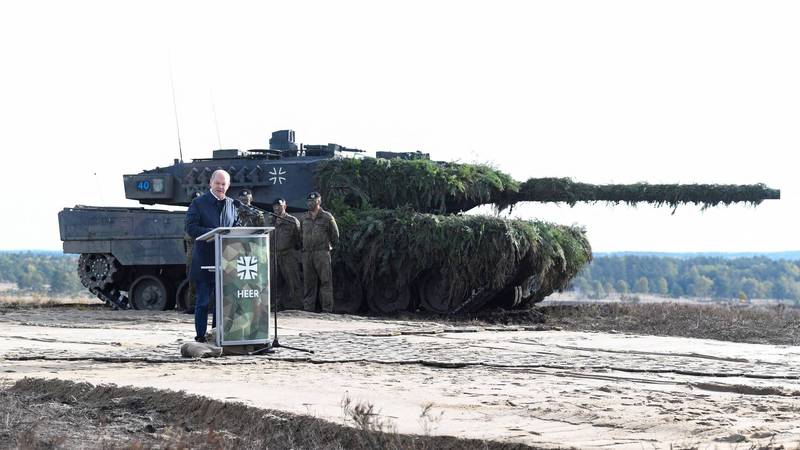German Chancellor Scholz visited the army base in Bergen last October and delivered a speech to the troops in front of the Leopard II tanks.
(Reuters file photo)
[Instant News/Comprehensive Report] In recent months, Ukraine has been appealing to its Western allies to provide German-made Leopard II main battle tanks to help Ukraine fight against Russian aggression. However, the Berlin authorities have not yet nodded and their attitude is hesitant. Therefore, they are under great pressure .
Swiss media revealed that Germany is worried that the United States will take away Germany's arms market in Europe and at the same time lose its influence on European security policy.
"New Zurich Daily" (Neue Zuercher Zeitung) on the 22nd Please continue reading...
">It is reported that the issue of Leopard 2 tank aid to Ukraine is not just a military issue, but a political issue related to the interests of armament policy. The German government believes that once all countries hand over all their Leopard 2 tanks to Ukraine, they will receive a large number of American-made tanks , Germany will lose its tank upgrades and follow-up market, as well as its influence on European security policy.
The German tank industry enjoys a high reputation abroad.
The Leopard II is the best tank in the world, but also one of the most expensive (7-8 million euros for the A7 version).
Just the North Atlantic Treaty Organization (NATO) and the European Union, 16 countries have purchased Leopard II tanks.
Turkey, Greece, Spain, Poland and Finland each have hundreds; Norway, Denmark and Canada have 50 or fewer.
Choosing a tank is a long-term commitment, and the education and training of soldiers, the infrastructure for maintenance and repair, the availability of spare parts, etc., will not change overnight.
Once a deal is made, it can last for decades, and once an order is lost, it will go out of business for a long time.
The report pointed out that this is not only an economic loss, the arms sales ensure the country's tax revenue and employment opportunities, as well as the profits of the arms companies.
Most importantly, however, arms exports are part of foreign and security policy, and any country that supplies another country with its own equipment secures trust and economic dependence, thereby gaining influence.
For the German tank industry, the lessons of Poland were particularly painful.
In the past 20 years, Poland has purchased more than 200 Leopard II tanks from Germany.
After Russia's annexation of Crimea, relations between Germany and Poland deteriorated. Warsaw accused Berlin of not wanting to offend Moscow, seeing Germany as an increasingly insecure strategic partner.
In August 2021, Poland announced that it plans to purchase 250 new tanks and 116 second-hand M1 Abrams main battle tanks from the United States, with a total price of 8.85 billion euros.
Last summer, Poland also approved the purchase of 1,000 K-2 main battle tanks from South Korea, but Germany, which also participated in the competition, failed.
Representatives of the defense contractors, who wished to remain anonymous, said the United States had promised countries that could supply Ukraine with Leopard II tanks in return for stockpiled replacements and long-term industrial partnerships.
It will be difficult for any country that accepts the US proposal to favor German tanks again, and Berlin's influence on these countries' armament policies will continue to decline.
